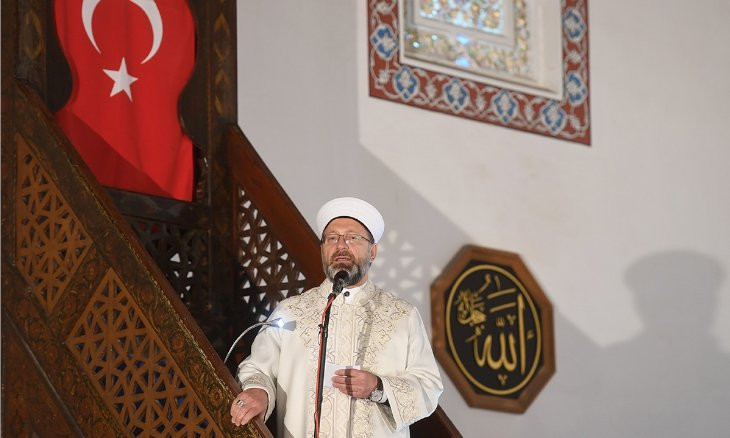German politicians criticize top Turkish cleric over comments targeting LGBTI individuals
Several German politicians have found recent remarks of Diyanet head Ali Erbaş on LGBTI individuals alarming, with one saying: "Erbaş's statements once again showed that the situation for LGBTI people in Turkey remains very difficult, indeed dangerous." They have also said that they were expecting imams affiliated with Diyanet's branch DİTİB, Germany's largest Islamic umbrella group, to "abide by the basic values of freedom and tolerance."
Duvar English
German politicians have said that they are concerned about the recent remarks of Turkey's Religious Affairs Directorate (Diyanet) head Ali Erbaş, who last week targeted Turkey’s LGBTI community and HIV-positive individuals during a sermon.
 Association urges Turkey's top religious authority head to apologize for targeting LGBT individuals
Association urges Turkey's top religious authority head to apologize for targeting LGBT individualsErbaş's statements "once again showed that the situation for LGBTI people in Turkey remains very difficult, indeed dangerous," Michael Roth, Germany's state minister for Europe, told Die Welt. Roth however said that the “critical reaction of Turkish civil society” against Erbaş's remarks made him a little optimistic.
Omid Nouripour, the foreign policy spokesman of Germany's Green Party in the Bundestag, told Die Welt that Erbaş's statements showed "how far the AKP policy had moved away from the rule of law and the protection of minorities," referring to Turkey's ruling Justice and Development Party (AKP), whose several top officials, including Turkish President Recep Tayyip Erdoğan, backed the top cleric.
Konstantin Kuhle, a member of the Free Democratic Party (FDP), warned against the officials' discriminatory remarks, saying: "Homophobia belongs to people with an authoritarian understanding of the state."
Politicians say Diyanet's affiliate DİTİB must respect tolerance, freedom
Mathias Middelberg, the spokesman for the CDU/CSU parliamentary group in the Bundestag, said that they have been expecting religious representatives working in Germany “to abide by the basic values of freedom and tolerance,” and this situation is also valid for imams affiliated with the Turkish-Islamic Union for Religious Affairs (DİTİB), which is a branch of Diyanet. In the past, DİTİB “unfortunately lost a lot of trust. This has to be regained," Middelberg told Die Welt.
Imams affiliated with DİTİB, Germany's largest Islamic umbrella group with 900 mosques, are educated, financed and sent from Turkey.
 Prosecutors' investigation widens to include Diyarbakır Bar Association after criticism of top cleric
Prosecutors' investigation widens to include Diyarbakır Bar Association after criticism of top clericSevim Dağdelen of the German Left Party (Die Linke), who has family roots in Turkey, said that she sees the statements of the Diyanet head as "renewed evidence that the Erdoğan regime is further radicalizing towards Islamism and the anti-democratic Muslim Brotherhood." Dağdelen also noted that the German government's cooperation with DİTİB regarding Islam classes should be ended, saying: “There should be no room in our schools for agitation against homosexuals."
German politicians' comments came after Erbaş on April 24 targeted LGBT individuals in a sermon, saying, “Homosexuality causes diseases and decays lineage.”
“Islam accepts adultery as one of the biggest sins [haram]. It curses homosexuality, because it causes diseases and decay to lineage,” Erbaş said in the sermon marking the first day of Ramadan amid the coronavirus (COVID-19) pandemic.
Erbaş’s remarks were slammed by a number of human rights organizations as well as the Ankara and Diyarbakır bar associations, the officials of whom now face investigation on charges of “insulting religious values.”
Şanlıurfa Bar Assocation: Erbaş's remarks are fascistic
Meanwhile, the bar association of the southeastern province of Şanlıurfa released a statement on April 29 saying that it stands by the Diyarbakır and Ankara bar associations.
“We would like to express that we do not accept Diyanet head's remarks and find them insulting against a fraction of the society as well as discriminatory and fascistic. We are standing by the Diyarbakır and Ankara bar associations and will be in solidarity until the end,” the statement read.
The Şanlıurfa Bar Association said that it “thoroughly” read the statements of both the Diyarbakır and Ankara bar associations criticizing Erbaş's remarks, but did not find “any phrase insulting our nation's religious values or any other values.”
